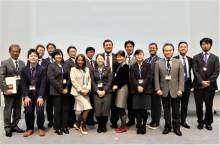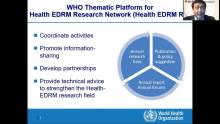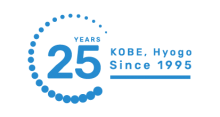2021

Promoting research for a better response to health emergencies and disasters
Health emergencies and disasters are growing in frequency and magnitude, with significant risks and consequences for many millions of people worldwide. In response, WHO set up the Thematic Platform for Health Emergency and Disaster Risk Management Research Network (Health EDRM RN) in 2016 to promote global research collaboration to inform relevant policies and programmes.
Two recent publications depict activities of the Health EDRM RN, underscoring its role as a platform that facilitates the reciprocal flow of knowledge, information and evidence in Health EDRM between the global and local arenas.
The WHO Kobe Centre (WKC), in collaboration with the Japanese Association for Disaster Medicine, held a workshop in February 2020 with Japanese experts to discuss priority activities of the Health EDRM RN, including the promotion of operational research to address the needs of emergency- and disaster-exposed individuals and communities, and strengthening the research capacity of the Health EDRM community. The workshop generated significant inputs and advice from local experts for advancing the field of Health EDRM. This included the use of mixed-methods designs and standardized data collection for operational research in Health EDRM, and the active educational use of the WHO Guidance on Research Methods for Health Emergency and Disaster Risk Management to strengthen research capacity of the Health EDRM community.
At the global level, two Core Group Meetings of the Health EDRM RN were held on 17–18 October 2019 and 27 November 2020 to discuss the development of a Health EDRM RN research agenda to identify research priorities for the translation of findings into policy and practice. The meetings also focused on the establishment of WHO’s Health EDRM Knowledge Hub, an online platform to provide knowledge and information on Health EDRM. This is expected to be a key source of global hazard information, useful for policymakers, government officials, frontline workers, hospital administrators and practitioners at country level. Read the publication here.
WKC is the secretariat of the Health EDRM RN, ensuring that its activities are relevant at both global and local levels.

How can countries strengthen health systems to improve health in older populations?
Around the world, rapid population ageing has challenged the ability of most countries to shift their health care systems towards delivering appropriate people-centred, quality services without incurring financial hardship for older persons and their families.
The WHO Kobe Centre (WKC) supported two studies in Thailand and the Philippines to shed light on strengthening health systems to better respond to the needs of older persons.
In Thailand, Asia’s fourth fastest ageing population, a novel service model of community-integrated intermediary care for older adults was evaluated. The findings show that participants were less frail and caregivers’ burden was significantly lower as a result of the community-based care model. These findings can strengthen care appropriate for older people especially in places where long-term care relies heavily on family caregivers. Findings could assist other countries wishing to adopt similar service delivery models. Click here to read more.
Human resources are an integral part of the service delivery. Interprofessional education among healthcare professions can build a workforce that can deliver services responsive to the complex needs of ageing populations. In the Philippines, a new training programme was evaluated to enhance interprofessional collaboration for hospital and community health workers which was found to improve attitudes and coordination of integrated care of older adults.
These results have important implications for improving quality of services for older persons. Workforce development may help integrate social and health care services to ensure universal health coverage (UHC) and strengthen the capacity of health systems to provide quality services to rapidly ageing populations. The findings are expected to be adapted for use in Viet Nam and other low- and middle-income countries. Find more about this project here.
The WHO Kobe Centre (WKC), a global centre of excellence for UHC, commissions research to address health systems responses to rapid population ageing, guides research priorities in countries, and helps countries to plan for sustainable UHC.
Photo credit: © WHO / Ploy Phutpheng

World No Tobacco Day 2021 Message of Dr Sarah Barber, Director of the WHO Centre for Health Development (WHO Kobe Centre)
World No Tobacco Day is celebrated on 31 May each year when WHO and its partners raise awareness about the deadly harms of tobacco use and exposure to second-hand smoke which kills 8 million people a year. This year’s theme Commit to Quit challenges smokers of any tobacco product to quit smoking, including e-cigarettes, heated tobacco products and smokeless tobacco. Switching is not quitting.
All forms of tobacco are deadly. The nicotine in smokeless tobacco is more easily absorbed than smoking cigarettes, making it more addictive. Heated tobacco products expose users to toxic emissions which can cause cancer. Nicotine in e-cigarettes is highly addictive, and non-smokers and bystanders are exposed to dangerous second-hand smoke.
We commend the local government for taking steps against passive smoking. As early as 2012, Hyogo Prefecture enacted the ‘Ordinance on the Prevention of Passive Smoking’, only the second of its kind in Japan. In April 2020, amendments to the ordinance came into full effect, specifically to protect those under 20 years old and pregnant women from passive smoking. In line with WHO’s recommendations, the amended ordinance treats heated tobacco the same way as cigarette tobacco, and prohibits smoking on the premises of all schools and medical institutions.
Evidence has shown that smokers are more likely to develop severe disease with COVID-19 compared to non-smokers. Tobacco is a major risk factor for noncommunicable diseases such as cardiovascular disease, respiratory disease and diabetes. People with these conditions are more vulnerable to severe COVID-19.
The pandemic has motivated millions of people to want to quit. Quitting tobacco is challenging, especially with the stresses that COVID-19 has brought. Yet it is never too late to quit, and the benefits are almost immediate: after just 20 minutes of quitting smoking, one’s heart rate drops; in 2-12 weeks, circulation improves and lung function increases. People who quit smoking after a heart attack cut their chances of another heart attack by 50%.
Many people do not have the tools to help them quit. WHO’s Commit to Quit campaign with partners and countries will help to
-
advocate for strong tobacco cessation policies,
-
increase access to cessation services,
-
raise awareness of tobacco industry tactics, and
-
empower tobacco users to try quitting through ‘quit and win’ initiatives.
WHO calls on governments to ensure their citizens have access to advice; toll-free quit lines; mobile and digital cessation services; and nicotine replacement therapies and other tools proven to help people quit. Strong cessation services improve health, save lives and save money. Commit to quit today!

Lecture at the Academic Symposium hosted by the Chinese University of Hong Kong
On April 25, 2021, Dr Ryoma Kayano, technical officer of WKC, gave a video lecture at an academic symposium organized by the Chinese University of Hong Kong.
The two-day academic symposium, titled "New Frontiers in Emergency and Disaster Care: Advancing Emergency Care in Greater China Rundown of Symposium and Workshop," was held to share experiences and knowledge among emergency medicine and health emergency management professionals and enhance the capacity of practitioners to face the challenges of emergency care in the future.
In his presentation titled "Research priorities of health-EDRM in the post COVID19 era", Dr. Kayano introduced the WHO Thematic Platform for Health Emergency and Disaster Risk Management Research Network (TPRN) of which WKC is the secretariat. He shared the latest findings on priority research topics in health emergency and disaster risk management in the post-COVID19 era.
Click here to read more: https://extranet.who.int/kobe_centre/en/project-details/TPRN

WKC commemorative brochure
The WHO Centre for Development (WHO Kobe Centre – WKC) has produced a brochure which chronicles its 25-year history.
“This snapshot of WKC’s work over the years describes highlights and events of the Centre’s contributions towards health development globally, and locally in Kobe, Japan where we are hosted,” said Dr Sarah Louise Barber, Director of the Centre.
“None of our work would have been possible without the generous and sustained support of the Kobe Group (Hyogo Prefecture, Kobe City, Kobe Chamber of Commerce and Industry, and Kobe Steel, Ltd) and the community. We look forward to fulfilling our global mandate and the needs of the people of Hyogo and Kobe in the coming years,” she said.
Click here to read the brochure.

Responding to health emergencies, developing health workforce capacities for disaster risk management
Developing health workforce capacities to responding to health emergencies is a critical to effective disaster risk management. However, this is an emerging field.
WKC supports research for stronger disaster response and more resilient health systems. In 2018 and 2019, the Centre convened expert meetings to identify gaps in research and knowledge, and promote evidence based recommendations in Health Emergency and Disaster Risk Management (Health EDRM).
Coinciding with World Health Worker Week (5-9 April 2021) and aligned with WHO’s Year of Health and Care Workers, WKC is publishing the first in a series of papers to gather evidence-based recommendations for strengthening the health emergency workforce. Laying the groundwork for future studies, this paper identifies research gaps and explores core competencies for Health-EDRM workforce training. This evidence will inform recommendations and best practices to guide policy and practice across WHO regions.
“This is the first step in synthesizing knowledge to address the need for evidence-based recommendations,” said WKC’s technical officer, Dr Ryoma Kayano.
“The consensus study and recommendations from this new body of work will be useful for low-and-middle income countries often affected by disasters for developing their emergency health workforce. In fact, all countries will benefit since COVID-19 has highlighted challenges in health workforce capacities everywhere.”
Japan and Kansai-based experts also contribute to this international research project by sharing experience in managing disasters.
Click here to read more: https://extranet.who.int/kobe_centre/en/project-details/h-edrm_area4

World Health Day 2021 Message of Dr Sarah Barber, Director, WHO Centre for Health Development (WHO Kobe Centre)
This year on World Health Day, 7 April, WHO is launching a campaign to build a fairer, healthier world. This is one of the founding principles of Universal Health Coverage (UHC): ensuring that people have access to quality services that they need without financial hardship. Identifying health inequalities and what drives them is essential in promoting coverage and financial protection.
Building resilient health systems to respond to population ageing is one of the pillars of WKC’s work. Globally, population ageing is growing at a rapid rate. Health systems must adapt to the changing needs of populations as they age and have the capacity to recognize and address diverse health care needs. Older populations face challenges in accessing the care they need. Monitoring UHC is important to determine the capacity of health systems to respond to people’s needs as they age.
WKC is supporting research globally to identify factors that affect equitable access to health and social care service coverage for older people. This information will help build systems to monitor access and use of health services and help national authorities to take appropriate action to address the inequities among older populations.
WHO is calling on policy-makers to collect and use timely and reliable health data, broken down by gender, age, income, education, migratory status, disability, and geographic location. This gives meaningful information to decision-makers to assess inequities across population groups and take policy actions to reduce these inequalities.
COVID-19 has highlighted how our world is unequal, with some people able to live healthier lives and have better access to health services than others, simply because of where they are born, grow, live, work and age. WHO is committed to ensuring that everyone, everywhere, can realize the right to good health.

WKC’s legacy: 25 years of contributions to local and international health work
Twenty-five years ago, the WHO Centre for Health Development (WHO Kobe Centre) was established in Kobe, Japan. The official inauguration on 17 March 1996 realized the vision of the Governor of Hyogo Prefecture, the Mayor of Kobe City and the Director-General of WHO to set up a research centre in Japan focusing on health development.
Today, WKC’s work is even more relevant as we conduct research on promoting health systems for universal health coverage in the context of population ageing, and advancing knowledge on health emergencies and disaster risk preparedness. Local engagement with communities in Hyogo, Kobe and the Kansai region more broadly is a cornerstone of our work.
Please see the grateful acknowledgement of WHO’s Director-General, Dr Tedros Ghebreyesus, to the four representatives of the Kobe Group for 25 years of sustained and generous support to WKC.

Economics of healthy and active ageing
The WHO Centre for Health Development, EURO Observatory for Health Systems and Policies and the WHO Western Pacific Regional Office issued six new reports studying the impact of population ageing on health expenditure trends in six countries (Vietnam, Mongolia, New Zealand, Australia, Republic of Korea, and Japan). We find that population ageing results in moderate increase in health care expenditures over time, but ageing is the not the main driver of health spending.
However, per person health spending for older age groups differ based on health status, whereas populations with older persons that have relatively high levels of disability may face higher health expenditures. Our simulations find that populations with lower levels of disability among older adults experience slower growth in health spending. This suggests that policies to promote good health as populations age are beneficial in reducing growth in health spending.
The reports can be accessed here

Hyogo high schools participate in first online WKC High School Forum
On 11 February 2021, over 200 students from 12 high schools across Hyogo Prefecture participated in the WKC Forum “High School Students Thinking Globally Day”. This event is co-organized by the WHO Kobe Centre, Hyogo Board of Education and Osaka University. It has been held annually since 2016 as an important local engagement activity of the WHO Kobe Centre. This year, the Forum was held virtually for the first time due to the COVID-19 pandemic.
In previous years, the highlight of this event has been a poster session of students’ research projects. This year, the students were asked in advance to submit video presentations of their independent research projects to an online platform created specifically for this event by Osaka University, where the video presentations would undergo peer review and formal judging by a panel of judges from the Board of Education. A total of 53 videos were submitted by individuals or groups of students from 15 different schools. The four presentations that received the highest marks from the panel of judges were from Hyogo High School, Nagata High School, Kakogawa Higashi High School and Himeji Nishi High School. The students were invited to give their presentations live during the online Forum.
The students gave outstanding presentations on topics of local interest with global relevance and consideration for the current pandemic, such as on the potential for virtual international tourism and effective remote learning/teaching techniques. The students also handled the Q&A session with Osaka University faculty members and graduate students with poise, demonstrating the skills of this young generation with information technology and remote communication.
The event also featured a discussion with Mr Yoshiaki Nagata, Deputy Assistant Director of the Japan International Cooperation Agency (JICA) Kansai Centre and Dr Megumi Rosenberg, Technical Officer of the WHO Kobe Centre. This session aimed to raise awareness about the work of these local organizations and promote general interest in global development careers. It elicited several questions from the students about each organization’s work, the impact of the current pandemic, and the educational and career experiences of Mr Nagata and Dr Rosenberg.
The Forum concluded with a message from Dr Sarah Louise Barber, Director of the WHO Kobe Centre, who congratulated the students and their teachers on their achievements despite the many challenges they faced this past year due to the pandemic.

